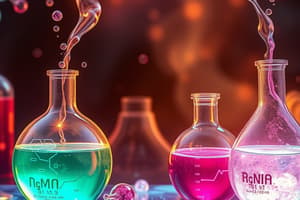Podcast
Questions and Answers
Which electrolyte is primarily responsible for maintaining fluid levels inside cells?
Which electrolyte is primarily responsible for maintaining fluid levels inside cells?
- Potassium (correct)
- Calcium
- Chloride
- Sodium
What is the recommended daily intake of sodium for adults?
What is the recommended daily intake of sodium for adults?
- 500 mg
- 3400 mg
- 1500 mg
- 2400 mg (correct)
What can result from sodium deficiency?
What can result from sodium deficiency?
- Muscle cramps
- Headache
- Loss of appetite
- All of the above (correct)
What happens when the body ingests excessive sodium?
What happens when the body ingests excessive sodium?
Which mineral is crucial for oxygen transport in the blood?
Which mineral is crucial for oxygen transport in the blood?
What is the condition caused by a deficiency of iron in the blood?
What is the condition caused by a deficiency of iron in the blood?
Which mineral's primary function is related to thyroid hormone production?
Which mineral's primary function is related to thyroid hormone production?
What condition is characterized by an enlarged thyroid gland?
What condition is characterized by an enlarged thyroid gland?
What is the primary role of water in the body?
What is the primary role of water in the body?
What condition is characterized by excessive water retention in the body?
What condition is characterized by excessive water retention in the body?
Which of the following is NOT a way that water is lost from the body?
Which of the following is NOT a way that water is lost from the body?
What is a potential consequence of dehydration?
What is a potential consequence of dehydration?
Which condition is characterized by a decrease in body fluid levels?
Which condition is characterized by a decrease in body fluid levels?
Which of the following is a consequence of fluid volume excess?
Which of the following is a consequence of fluid volume excess?
What is the primary function of the sodium/potassium pump?
What is the primary function of the sodium/potassium pump?
What is the condition known as when excessive water is consumed quickly?
What is the condition known as when excessive water is consumed quickly?
What is the primary function of fluoride in the body?
What is the primary function of fluoride in the body?
Which of these is a potential consequence of fluoride deficiency?
Which of these is a potential consequence of fluoride deficiency?
What is the primary function of selenium in the body?
What is the primary function of selenium in the body?
Which of these is a good source of selenium?
Which of these is a good source of selenium?
What is the condition characterized by excessive copper accumulation in the body?
What is the condition characterized by excessive copper accumulation in the body?
What is the primary function of chromium in the body?
What is the primary function of chromium in the body?
What is the recommended daily water intake for adults?
What is the recommended daily water intake for adults?
What is the difference between hard water and soft water?
What is the difference between hard water and soft water?
What is one of the key functions of water in the body?
What is one of the key functions of water in the body?
Which type of dehydration occurs when water loss exceeds electrolyte loss?
Which type of dehydration occurs when water loss exceeds electrolyte loss?
Which symptom is NOT commonly associated with dehydration?
Which symptom is NOT commonly associated with dehydration?
What is the primary extracellular cation responsible for maintaining fluid balance?
What is the primary extracellular cation responsible for maintaining fluid balance?
Which of the following is a cause of fluid volume deficit (FVD)?
Which of the following is a cause of fluid volume deficit (FVD)?
Which of the following dimensions of health focuses on emotional resilience and mental well-being?
Which of the following dimensions of health focuses on emotional resilience and mental well-being?
What role do minerals play in the body?
What role do minerals play in the body?
Which major electrolyte is primarily involved in heart function?
Which major electrolyte is primarily involved in heart function?
What is the RDA of calcium for adults over the age of 50?
What is the RDA of calcium for adults over the age of 50?
Which of the following are considered factors that enhance calcium absorption?
Which of the following are considered factors that enhance calcium absorption?
What is a common symptom of calcium deficiency?
What is a common symptom of calcium deficiency?
Which trace mineral is primarily involved in oxygen transport?
Which trace mineral is primarily involved in oxygen transport?
What is the Estimated Minimum Requirement (EMR) of sodium for adults?
What is the Estimated Minimum Requirement (EMR) of sodium for adults?
Which of the following is NOT a good source of calcium?
Which of the following is NOT a good source of calcium?
Which mineral is associated with immune function and plays a role in over 200 enzymes?
Which mineral is associated with immune function and plays a role in over 200 enzymes?
What can excessive phosphorus intake lead to regarding calcium absorption?
What can excessive phosphorus intake lead to regarding calcium absorption?
Flashcards are hidden until you start studying
Study Notes
Water Loss from the Body
- Water is lost through urine, sweat, feces, insensible perspiration, and other bodily fluids like tears, vomit, blood, and drainage from burns and ulcers.
Functions of Water
- Water is a solvent that dissolves and transports nutrients and waste.
- It lubricates joints and organs.
- It helps regulate body temperature.
- Water provides structure and rigidity to cells.
- It participates in metabolic reactions.
Dehydration Types and Causes
- Isotonic dehydration: Loss of equal amounts of water and electrolytes, caused by insufficient fluid intake and fluid shifts.
- Hypertonic dehydration: Water loss exceeds electrolyte loss.
- Hypotonic dehydration: Electrolyte loss exceeds water loss.
Dehydration Symptoms
- Increased pulse rate
- Decreased urinary output
- Poor skin turgor
- Decreased blood pressure
- Orthostatic hypotension
- Dry mouth and skin
- Fever
- Unusual drowsiness
- Lightheadedness or disorientation
- Extreme thirst
- Nausea
- Slow or rapid breathing
- Sudden weight loss
Major Electrolytes and Functions
- Sodium: Primary extracellular cation, maintains fluid balance, supports nerve and muscle function, and regulates blood pressure.
- Potassium: Primary intracellular cation, maintains fluid balance, supports nerve and muscle function, and regulates heart function.
- Chloride: Key extracellular anion, assists in fluid balance, and is a component of hydrochloric acid in the stomach.
Causes of Fluid Volume Deficit (FVD) and Fluid Volume Excess
- FVD: Caused by diarrhea, vomiting, high fever, excessive sweating, diuretics, and polyuria.
- Fluid Volume Excess: Caused by compromised regulatory mechanisms, excess fluid intake, and excess sodium intake.
Five Dimensions of Health
- Physical
- Intellectual
- Emotional
- Social
- Spiritual
Mineral Functions
- Provide rigidity and strength to bones and teeth.
- Regulate nerve and muscle function.
- Act as cofactors for enzymes.
- Maintain proper acid-base balance of body fluids.
- Support blood clotting.
- Facilitate tissue repair and growth.
Major Minerals and Recommended Daily Intake
- Calcium: 1000 mg for men and women ages 19-50, 1200 mg for those over 50.
- Phosphorus: 700 mg for men and women ages 19 and older.
- Magnesium: 420 mg for men, 320 mg for women.
- Sulfur: No specific RDA, adequate protein intake provides sufficient sulfur.
- Sodium: No RDA, Estimated Minimum Requirement (EMR) is 500 mg for adults.
- Potassium: EMR is 2000 mg for adults.
- Chloride: EMR is 750 mg for adults.
Calcium Sources
- Dairy products: Milk, yogurt, cheese, ice cream.
- Non-dairy sources: Green leafy vegetables, small fish with bones, legumes, and tofu processed with calcium.
Factors that Enhance or Decrease Calcium Absorption
- Enhancers: Lactose, vitamin D, acidic digestive mass
- Decreasers: Binders like phytic and oxalic acids, dietary fat, high-fiber intake and laxatives, excessive phosphorus or magnesium intake, sedentary lifestyle, certain drugs
Calcium Deficiency and Toxicity
- Deficiency: Osteoporosis, muscle spasms (tetany)
- Toxicity: Constipation, urinary stone formation, reduced absorption of iron, zinc, and other minerals
Trace Minerals and Functions
- Iron: Oxygen transport, assists enzymes in oxygen use.
- Zinc: Over 200 enzymes, growth, taste and smell, healing, immune system, carbohydrate metabolism.
- Iodine: Thyroxine hormone production, growth, development, metabolism, body temperature.
- Fluoride: Tooth formation, resistance to decay, bone mineralization.
- Selenium: Antioxidant, thyroid function.
- Copper: Coenzyme, antioxidant reactions, energy metabolism, wound healing, nerve fiber protection, iron use.
- Chromium: Carbohydrate metabolism, glucose tolerance factor.
- Manganese: Component of enzymes involved in metabolic reactions.
- Molybdenum: Functions as a cofactor.
Studying That Suits You
Use AI to generate personalized quizzes and flashcards to suit your learning preferences.




